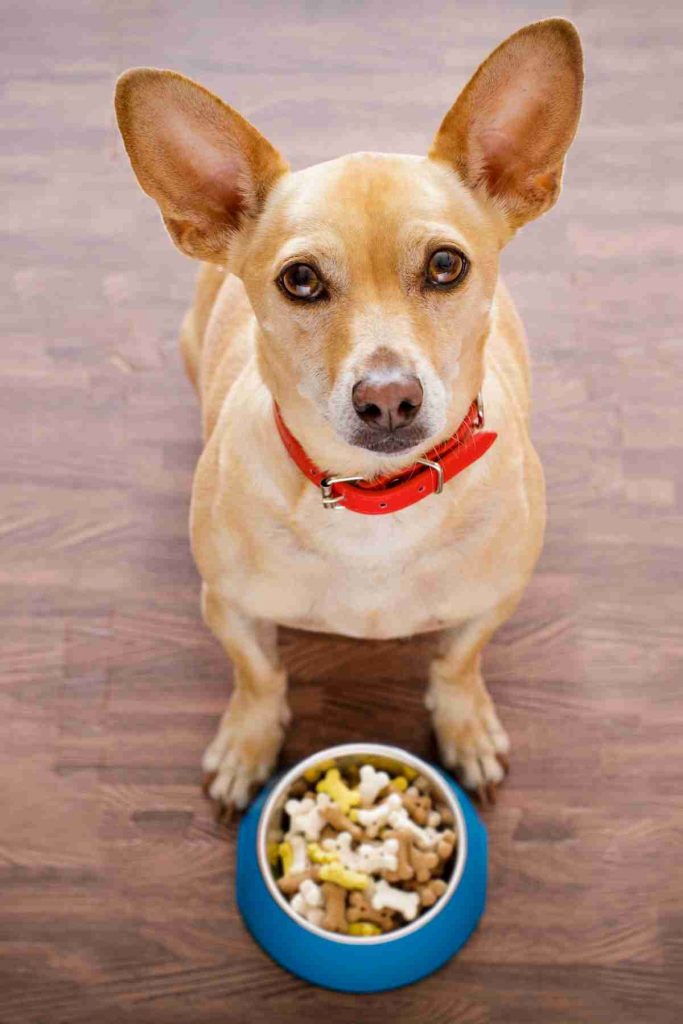
Your furry friend can have chickpeas! When it comes to incorporating them into your dog’s diet, sticking to the natural form is key. Highly-processed alternatives might not be as beneficial. Chickpeas boast protein and fiber, making them a fantastic addition to your pup’s meals.
These wholesome treats will keep your dog feeling satisfied and energized without causing any strain on your wallet. However, as with any food you introduce to your dog’s diet, there are a few important considerations to keep in mind. Let’s delve into those right here!
Chickpeas indeed offer a plethora of nutritional benefits for our canine companions, much like they do for us humans. Their natural abundance of essential nutrients makes them a valuable addition to a dog’s diet:
Protein: Crucial for muscle development and overall strength, chickpeas provide a plant-based protein source that supports your furry friend’s active lifestyle.
Fiber: A key player in maintaining digestive health, the fiber content in chickpeas aids in regulating bowel movements and promoting a balanced gut environment for your dog.
Iron: Combatting fatigue and lethargy, the iron found in chickpeas helps ensure your dog stays energized and ready for playtime.
Magnesium: Contributing to metabolic activity and overall energy levels, magnesium in chickpeas supports various bodily functions, keeping your dog vibrant and lively.
Selenium: Vital for cognitive function and immune system support, selenium found in chickpeas helps keep your dog’s mind sharp and their defenses strong against illnesses.
Vitamin B: Essential for promoting healthy hair and skin, the presence of Vitamin B in chickpeas contributes to your dog’s overall well-being, keeping their coat shiny and their skin nourished.
Given these benefits, incorporating chickpeas into your dog’s diet can be a nutritious choice. However, moderation is key. It’s essential to consider your dog’s individual dietary needs and consult with your veterinarian to determine the appropriate amount of chickpeas to include in their meals. With careful consideration and proper portioning, you can harness the goodness of chickpeas to enhance your dog’s health and vitality.
Moderation is key when it comes to feeding.
When it comes to incorporating chickpeas into your furry friend’s diet, balance is key. It’s perfectly fine to include cooked chickpeas, whether freshly prepared or from a can, in your dog’s meals, as they offer a healthy protein boost. However, like with any addition to their diet, moderation is essential.
If you’re concerned about inadvertently overfeeding your dog on chickpeas, an excellent alternative is opting for commercially prepared dog food that already contains chickpeas. This ensures your canine companion receives the right amount of this ingredient, eliminating the guesswork and potential for overindulgence. Essentially, you’re reaping all the benefits without the added worry, as the formula has already been carefully crafted to meet your dog’s nutritional needs.
Can dogs have hummus?
When it comes to sharing snacks with your furry friend, it’s essential to navigate the options carefully, especially when it comes to chickpea-based products like hummus. While chickpeas themselves can offer some nutritional value to dogs, the same can’t be said for hummus, unfortunately.
One of the main concerns with feeding your dog hummus is the presence of added fats, often in the form of olive oil. While healthy for humans in moderation, these fats can be too much for our canine companions, leading to potential health issues over time.
Moreover, the seasoning used in hummus, along with ingredients like onion and garlic, can spell trouble for your pup’s digestive system. These additives aren’t part of a dog’s natural diet and can lead to gastrointestinal upset or even more severe complications.
Even the citric acid from lemon juice, a common ingredient in hummus, isn’t something dogs should consume regularly. It can disrupt the delicate balance of their stomachs, causing discomfort and distress.
In the end, while chickpeas themselves may offer some benefits, the risks associated with the other components of hummus outweigh any potential advantages. It’s best to stick to dog-friendly treats and avoid sharing hummus with your canine companion to ensure their well-being and happiness.
Can Dogs Have Chickpeas?
Wondering if your dog can enjoy chickpeas? Chickpeas, also known as garbanzo beans, offer nutrients beneficial to humans but require caution when it comes to our furry friends. While chickpeas themselves aren’t toxic to dogs and provide protein, fiber, and vitamins, they should be fed sparingly and cooked thoroughly to aid digestion.
Raw chickpeas can lead to gastrointestinal discomfort in dogs, so opt for cooked ones instead. However, ensure they’re served plain, without added seasonings, oils, or ingredients like garlic and onion, which can be harmful to dogs.
Always consult your veterinarian before introducing chickpeas into your dog’s diet. They can offer tailored advice based on your dog’s health and dietary needs. Remember, moderation and proper preparation are key to incorporating chickpeas safely into your dog’s meals.
Are chickpeas easy for dogs to digest?
When it comes to our furry companions, ensuring their digestive health is paramount. Much like Goldilocks’ quest for the perfect bowl of porridge, finding the right balance for our dogs’ diets can sometimes feel like a delicate dance. Enter chickpeas, packed with fiber that doesn’t get digested but plays a crucial role in promoting optimal bowel health.
You see, chickpeas may not be the easiest to digest outright, but they possess a paradoxical quality. In the right amounts, they aid digestion, acting as a gentle regulator for your canine companion’s gastrointestinal system. It’s all about finding that sweet spot, much like Goldilocks finding the porridge that was just right.
It’s essential to strike a balance with fiber intake for our furry friends. Too much or too little can lead to digestive woes, from constipation to diarrhea. But with the right quantity of fiber from chickpeas, you can help your dog maintain regular bowel movements and cultivate a healthier digestive tract overall.
In the world of dog food, there’s a growing trend away from traditional grain fillers. Instead, manufacturers are turning to alternatives like chickpeas to provide energy-dense nutrition. You’ll often find these legumes, alongside peas and other nutritious ingredients, in modern dog foods, offering a wholesome and balanced diet for your beloved pet.
What should I combine chickpeas with for my dog?
Chickpeas, undoubtedly a nutritional powerhouse, boasts high levels of protein, a vital component for our canine companions. However, it’s crucial to note that this protein predominantly falls under the category of plant protein. While beneficial, dogs require a diverse array of amino acids that are more readily found in animal-based proteins, commonly derived from meat-centric diets.
For dog owners who opt for kibble as a dietary staple, it’s advisable to seek out formulations that incorporate meat proteins alongside plant-based ingredients like chickpeas. This ensures a balanced intake of essential nutrients for your furry friend.
Wondering how to incorporate chickpeas into your dog’s diet? Here are some paw-some ideas:
Integrated into Pre-made Kibble: Seek out kibble options that include chickpeas as part of their ingredient list. This allows your dog to enjoy the nutritional benefits of chickpeas alongside other essential nutrients provided by meat proteins.
Roasted and Dried Treats: Transform chickpeas into delectable snacks by roasting and drying them. These crispy chickpea treats make excellent rewards for walks or training sessions, offering both flavor and nutrition to your canine companion.
Ground Chickpea Flour for Homemade Treats: Harness the versatility of chickpeas by grinding them into fine flour, which can then be used to bake homemade dog treats. From biscuits to pup-friendly cakes, the possibilities are endless, providing your dog with wholesome and delicious snacks.
By incorporating chickpeas into your dog’s diet thoughtfully, you can ensure they enjoy the nutritional benefits while still meeting their dietary requirements for optimal health and happiness.
Consultation
In this consultation, the concerned pet owner seeks guidance from the veterinarian regarding whether dogs can have chickpeas. The veterinarian provides valuable information about the safety, benefits, risks, and proper introduction of chickpeas into a dog’s diet, emphasizing the importance of consulting with a veterinarian for personalized advice.

